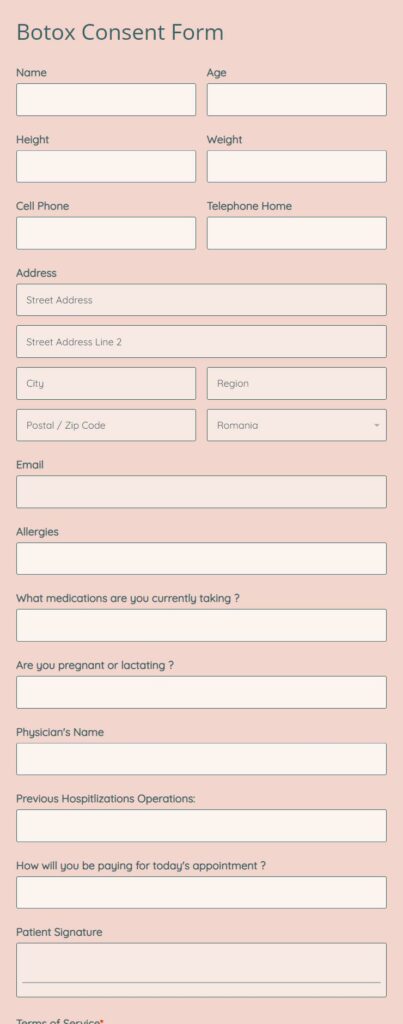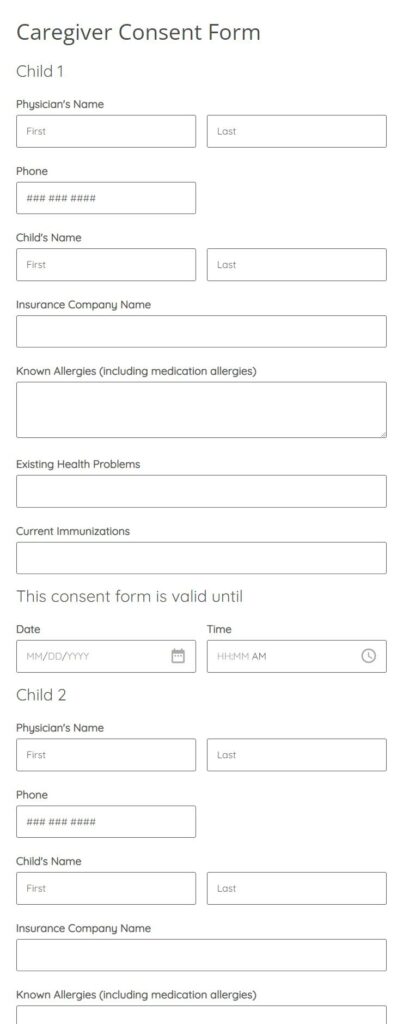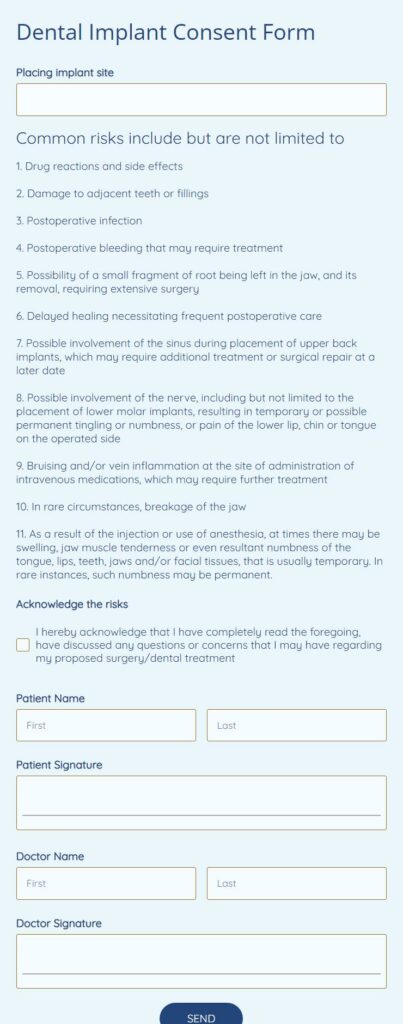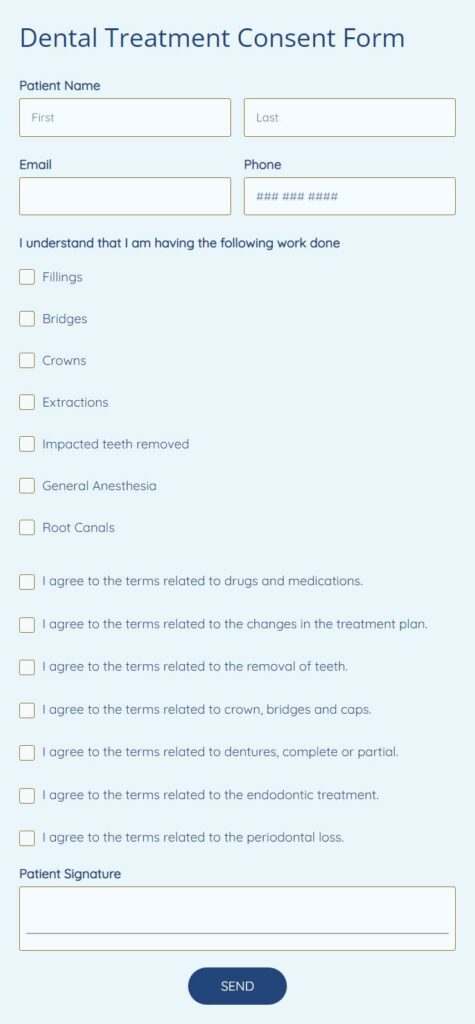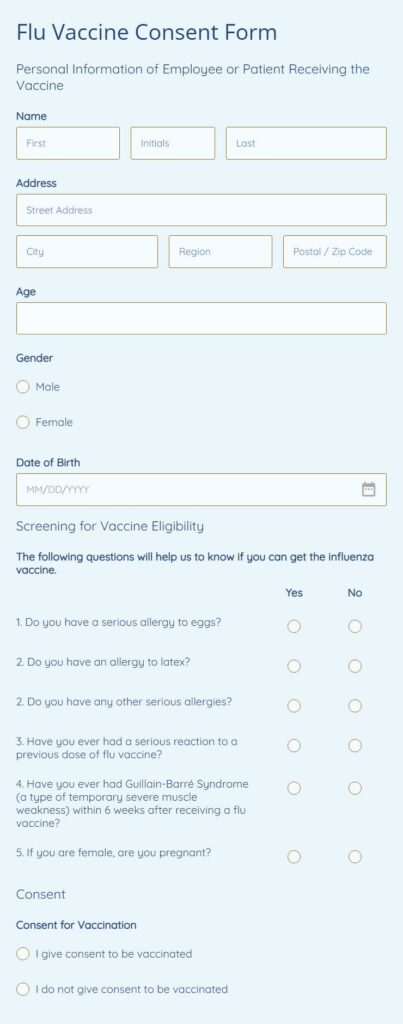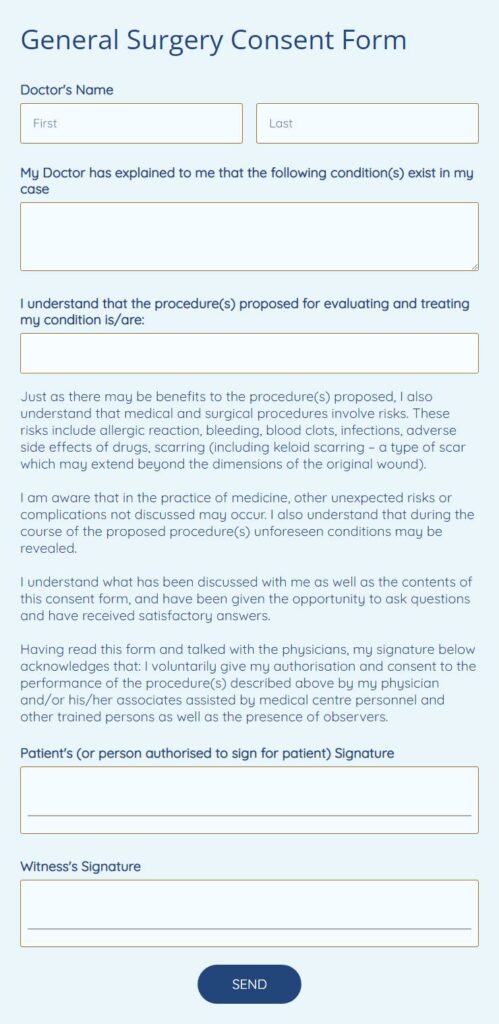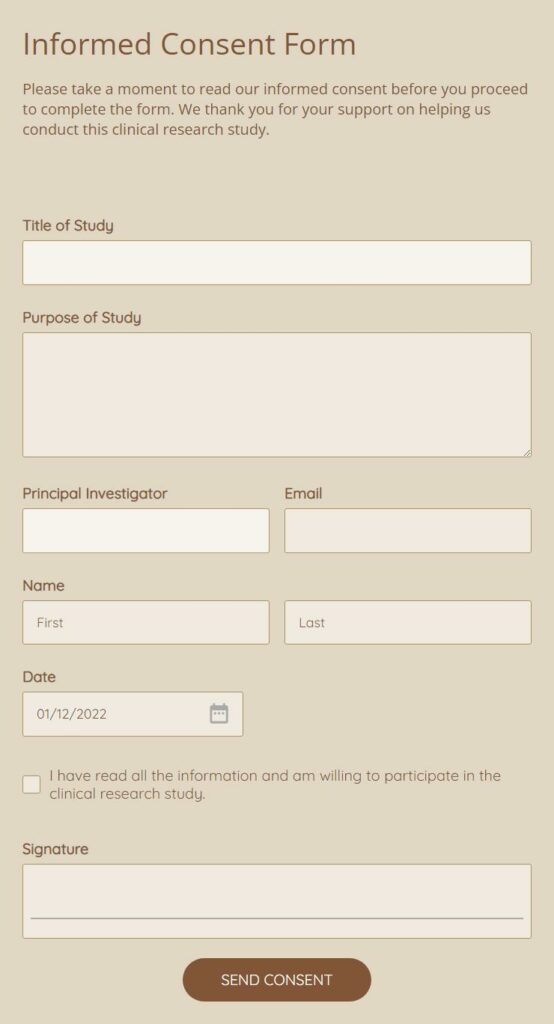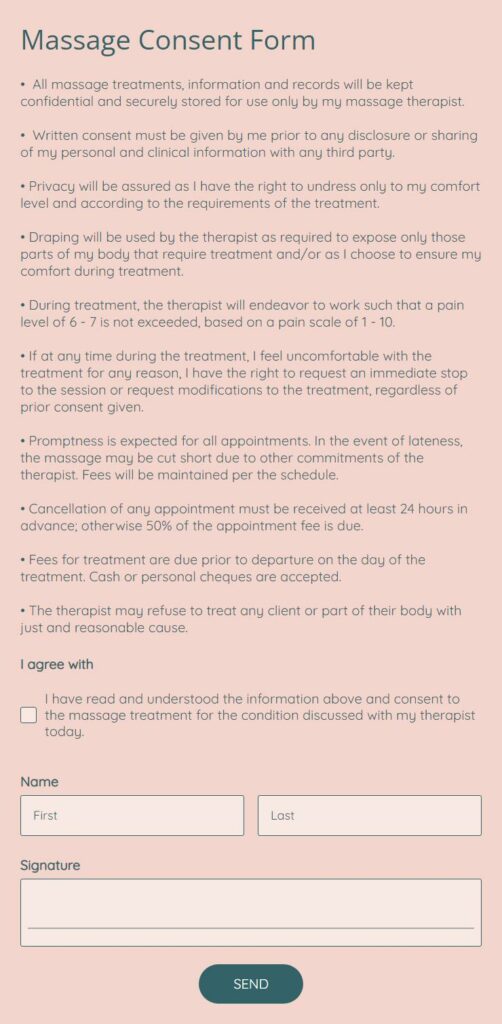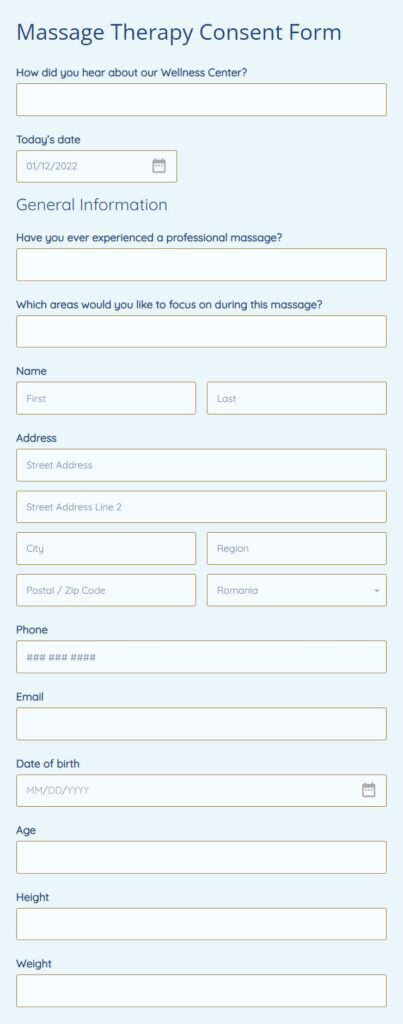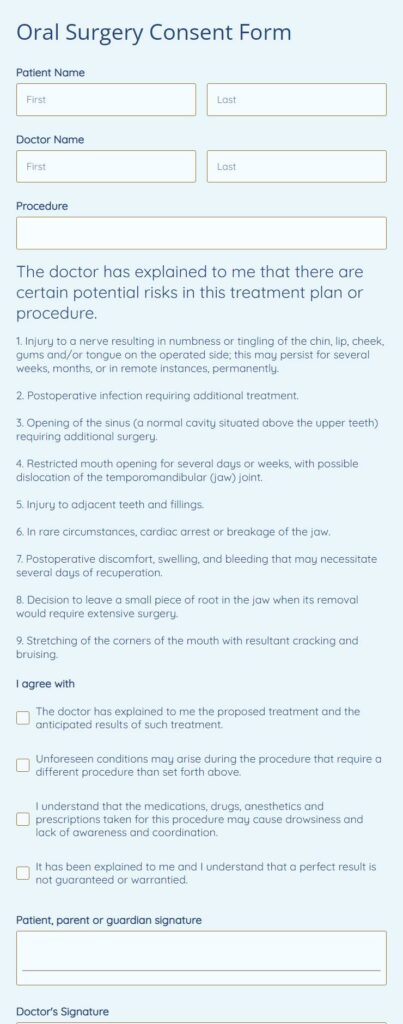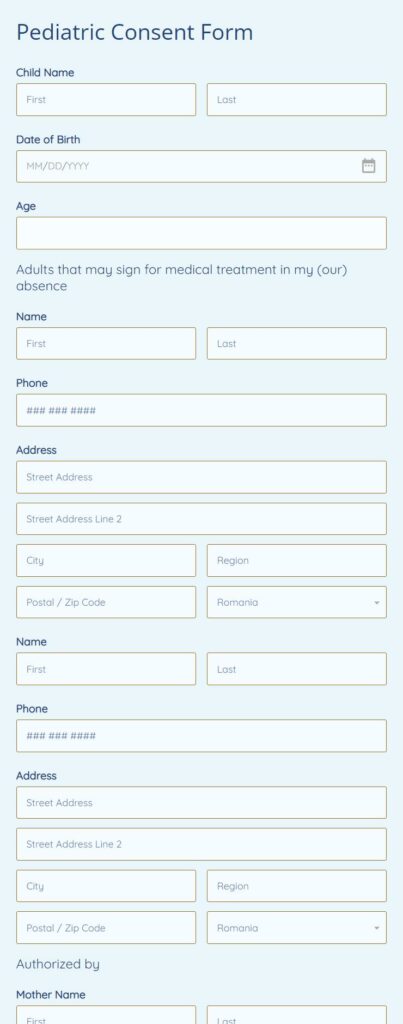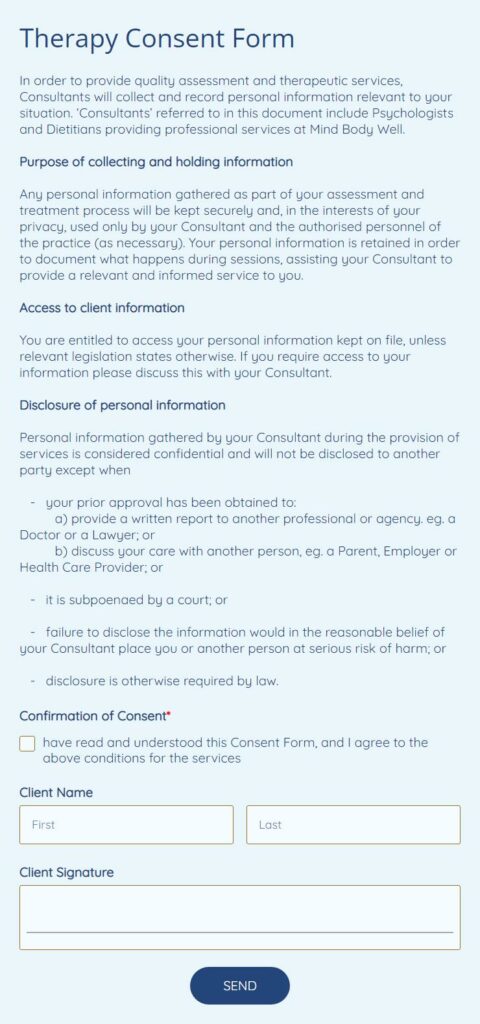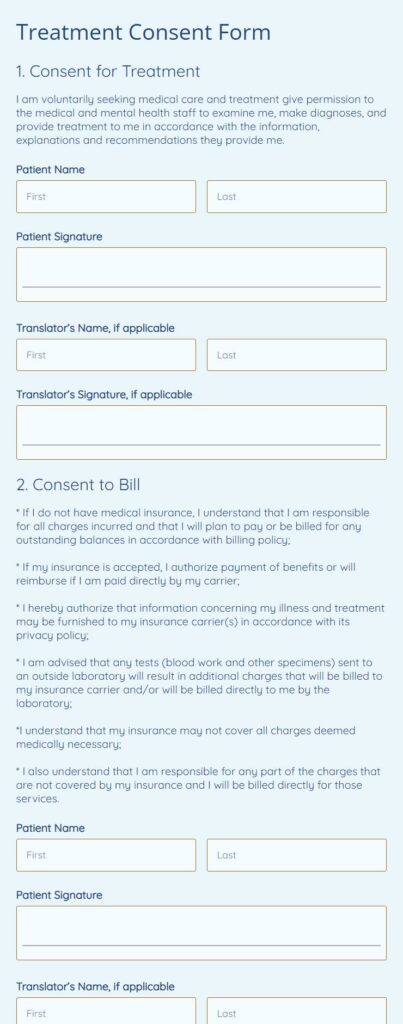13 Medical Consent Forms to Help Health Providers Stay Compliant
Informed consent plays a crucial role in medical law and ethics. Medical practitioners, clinics, and facilities use medical consent forms to ensure that their patients know treatment risks, benefits, and alternatives before undergoing any procedure.
Collecting patient information and their consent is essential—whether you run a small clinic or large healthcare facility. Luckily for you, we’ve covered the top 13 medical consent forms to streamline patient information management at your medical practice.
Read on for more.
1. Botox Consent Form
Who needs this?
This consent form is for clinics providing botox (botulinum toxin) treatments and procedures. Cosmetic surgeons, nurses, and cosmetic practices can use this form to collect and store legally binding medical information before the treatment begins.
What’s it for?
A botox consent form helps a medical practitioner gather patient information, such as medications, allergies, medical history, and pregnancy status. You can use this information to decide the treatment plan and minimize potential complications or side effects, and gain patient consent before performing any procedures.
Key benefits:
- Go paper-free: paper forms are difficult to efficiently store and manage, and have a negative environmental impact. 123FormBuilder helps you minimize office clutter with e-forms and streamline patient consent collection.
- Fully customizable: gather necessary information with custom fields when you need more information before performing complex surgeries.
- Conditional logic/ question branching flow: personalize consent form questions depending on the patients’ previous responses. For example, if they’re getting botox on their face there’s little need for questions relating to the rest of their body.
2. Caregiver Consent Form
Who needs this?
Parents or guardians use caregiver consent forms to authorize others to make medical decisions for their kids or dependants. Healthcare facilities use these forms to collect informed parental consent before performing medical procedures.
What’s it for?
This consent form authorizes medical providers to take necessary medical decisions in case guardians are not present to make decisions. Healthcare facilities use this form to find out more about a patient’s existing health problems, allergies, vaccinations, and insurance details.
Key benefits:
- Increase efficiency: use e-forms to reduce back and forth document sharing with legal guardians (the form already includes a signature field to make it legally binding)
- Streamline processes: use 123FormBuilder’s integration and automation capabilities to sort, categorize, and maintain patient data.
- Stay compliant: ensure patient data confidentiality with 123FormBuilder’s HIPAA-compliant form tool with the Enterprise plan.
3. Dental Implant Consent Form
Who needs this?
Dental clinics and practices use this form to collect patient consent for dental implant procedures. This consent form helps patients understand possible risks and complications before undergoing surgery.
What’s it for?
Dentists use this form to help patients make informed decisions about dental implant surgery. Dental implant forms include details on possible complications, such as drug reactions, post-operative bleeding, delayed healing, vein inflammation, and numbness.
Key benefits:
- Reduce human error: paper forms are often lost amongst office clutter. These e-forms make it easy for you to collect and securely store forms.
- Customize forms: 123FormBuilder makes it effortless for you to add upload fields, logos, or other information to the consent form to ensure it reflects your practice.
- Make it easy: make it easy for in-pain patients to give consent and get started with easy-to-fill and accessible forms.
4. Dental Treatment Consent Form
Who needs this?
Dentists and dental health assistants use this form to obtain patient consent for dental procedures. Patients are walked through the procedure, then given this form to confirm they consent to the upcoming treatment.
What’s it for?
Dental surgeons use this form to explain the risks involved with dental treatment plans. They require patients to specify the dental work that they agree to undergo. This consent helps protect both patients and doctors.
Key benefits:
- Digitize practice: use this form to digitize consent collection and streamline electronic medical record management.
- Integrate with your existing workflow: connect this form to existing systems to easily store and manage your data with your existing business solutions.
- Email notifications: automate email notifications for relevant parties following form completion and submission.
5. Flu Vaccine Consent Form
Who needs this?
This form is for healthcare professionals to collect consent from patients before administering flu vaccine shots. Flu vaccine consent forms help healthcare workers understand a patient’s medical history and check patient eligibility.
What’s it for?
A flu vaccine consent form records necessary medical details to check whether a patient’s eligible to receive a shot. By signing the consent form, the patient verifies that the information they’ve provided is true and that they’re ready to receive the vaccine.
Key benefits:
- Set up automated notifications: keep patients and your team informed with fast and secure email notifications.
- Improve efficiency with online forms: use digital forms to collect and store vaccine consent data without having to worry about losing forms or organizing them.
- Thank patients: appreciate patients’ time and effort with custom thank you pages following form submission.
6. General Surgery Consent Form
Who needs this?
Healthcare facilities or hospitals use general surgery consent forms to obtain patients’ permission for surgical procedures. Patients use this form to declare that they fully understand their conditions and proposed operation plans.
What’s it for?
A general surgery consent form covers medical and surgical risks, along with patient conditions and treatment plans. Patients read these plans carefully to understand risks and authorize doctors to perform medical procedures.
Key benefits:
- Send automated notifications: use 123FormBuilder’s email notification capabilities to automatically send patient submissions to different departments and patients’ guardians.
- Customize fields: use the drag & drop form builder editor to add custom fields and capture relevant information.
- Upload images: add images to explain surgical procedures and fully inform patients.
7. Informed Consent Form
Who needs this?
Clinical research institutes or individual researchers use informed consent forms to obtain consent from research study participants. This form helps ensure patients acknowledge possible consequences of participating in clinical trials and share consent accordingly.
What’s it for?
An informed consent form provides participants or patients with the information necessary to decide to volunteer in research studies. This form legally protects researchers in the case of unfavorable research outcomes.
Key benefits:
- Use conditional logic/ question branching: create responsive forms that adapt to your participant’s previous responses.
- Digitize records: use online forms to streamline consent collection and digitize consent management with ease.
- Show a thank you page: create a custom thank you page to appreciate participants volunteering in research studies.
8. Massage Consent Form
Who needs this?
Physical therapists and therapy clinics use massage consent forms to obtain patients’ consent before administering massage therapies. Massage therapy consent is critical for setting patient expectations and protecting therapists in the eyes of the law.
What’s it for?
A massage consent form outlines the massage treatment and therapist communication protocols. The form includes the terms and conditions of the treatment to ensure patients are fully informed on what they’re consenting to.
Key benefits:
- Add upload fields: use the drag and drop tool to build a custom form with upload fields for adding documents and images.
- Go paper-free: send environmentally friendly forms that patients can submit anywhere and you can store easily.
- Boost efficiency: streamline the massage consent collection process with integration and automation capabilities.
9. Massage Therapy Consent Form
Who needs this?
Massage therapists use this form to understand client preferences and expectations. Responses to these questions help therapists to be familiar with patients’ health conditions and deliver a better massaging experience. Furthermore, e-signature fields can be included on this form, to make it binding when consent is needed from the massage patient.
What’s it for?
Patients fill in a massage therapy consent form to inform therapists about their medical history, massage preferences, and personal details. This information helps therapists cater to patients’ needs better and create suitable plans with the patient’s consent.
Key benefits:
- Stay HIPAA-compliant: protect patient information privacy with the Enterprise plan that features enterprise-grade security, HIPAA compliance, and more.
- Manage consent online: digitize your massage therapy practice with online forms that you can easily access, store, and manage from anywhere.
- Integrate with existing systems: maintain data consistency and accuracy across all existing business platforms with seamless integrations.
10. Oral Surgery Consent Form
Who needs this?
Dentists and dental surgeons use this form to obtain oral surgery consent from patients. The consent form ensures that patients fully understand treatment plans and risks.
What’s it for?
Oral and maxillofacial surgeons require patients to fill out oral surgery consent forms before going ahead with dental procedures. Patients sign these forms detailing anticipated results, side effects, and possible dangers of treatment plans. The informed consent of patients allows surgeons to perform the necessary procedures.
Key benefits:
- Send automated notifications: automate email notifications upon consent submission and keep everyone in the loop.
- Include images in your form: use 123FormBuilder’s drag and drop tool to add images to your forms that detail the proposed procedure.
- Reduce human error: minimize form misplacements with digital consent forms.
11. Pediatric Consent Form
Who needs this?
Pediatricians use pediatric consent forms to collect parents’ consent before treating their children. If you run a pediatric clinic, you can use this form to collect parents’ or legal guardian details.
What’s it for?
A pediatric consent form aims to ensure timely treatment of children with prior consent from their parents. This consent enables doctors to perform necessary treatments on minors who are unable to legally give informed consent.
Key benefits:
- Show appreciation: use easy-to-create thank you pages to pleasantly surprise patients filling the form.
- Keep data secure: keep consent data safe and confidential with HIPAA-compliant forms with 123FormBuilder’s enterprise plan.
- Set conditional rules: use conditional logic to create dynamic forms that ask relevant questions based on a patient’s answers.
12. Therapy Consent Form
Who needs this?
Psychologists at wellness clinics and psychology clinics use therapy consent forms to obtain patients’ consent for therapeutic services. If you run a wellness clinic, you can use this form to collect patient data and consent.
What’s it for?
This form outlines treatment details and gets the patient’s permission to collect and hold patient information. For example, you may retain patients’ session information and their reaction to therapy—patients need to consent to you storing their private information.
Key benefits:
- Access easily: share online consent forms with patients so that they can sign them from anywhere (including mobile devices, as this form is mobile-friendly.)
- Personalize your form: customize forms with brand logos and colors to provide a great patient experience from start to finish.
- Manage forms better: leverage form automation to streamline your patient data management processes.
13. Treatment Consent Form
Who needs this?
Healthcare organizations and clinics use these consent forms to obtain permission for patient diagnosis, treatment, and payment. Patients fill out these forms before receiving treatment from medical or mental health staff.
What’s it for?
This form allows healthcare professionals to obtain legal consent before diagnosis and treatment. Medical facilities also use this form to create a contractual agreement with patients that ensures payment in the case they don’t have medical insurance.
Key benefits:
- Go paperless: reduce the environmental impact of your clinic by taking your forms online.
- Automate notifications: send auto-notifications to patients to request form completion and to medical professionals in your facility to notify them that a form’s been submitted.
- Custom fields: customize medical consent form templates to add necessary fields that capture valuable information.
Get informed consent for successful patient-physician relationships
Health consent forms make it effortless for healthcare facilities to ensure patient protection, share key information, and obtain consent from patients.
Use 123FormBuilder’s intuitive sample medical consent forms to create, share, and manage healthcare consent forms and their responses. Get started today to experience how online forms can help you provide a better patient experience.
Medical Consent Forms: Frequently Asked Questions
What forms are used for medical billing?
Healthcare insurance providers use two types of forms for medical billing: UB-04/CMS-1450 and 837-I.
UB-04/CMS-1450 forms are for manual claim submissions and an 837-I form is for electronic claim submissions
Patients should use either of these forms to submit medical expenses.
What is a consent form in healthcare?
In healthcare, a consent form is a legal document that serves as proof of your informed, voluntary consent for diagnostics, treatments, and procedures. A patient signs these forms to acknowledge that they are aware of potential risks and dangers.
How do you make a medical consent form?
You can use a medical consent form template to personalize your forms with additional fields, logos, names, designs, and conditional formatting to ensure full information disclosure. Use 123FormBuilder’s easy to use and intuitive medical form templates to design consent forms effortlessly.
Why is patient consent important in healthcare?
Patient consent forms safeguard doctors and healthcare facilities from legal actions following a medical procedure or incident. Healthcare service providers use consent forms to help patients make informed decisions on their healthcare.
How do you write an informed consent form?
The first step of creating an informed consent form is to outline patient information and what they’re consenting to. This includes highlighting potential complications or issues to ensure patients are fully informed about the treatment and its risks.
It’s essential to include a section for patient signature following the procedure details. This verifies they’ve read the details, and give their approval to undergo treatment.
How do you write a medical consent form for a child?
Writing a medical consent form for a child is similar to creating one for an adult. You must first collect personal details—in this case, from both the patient and their guardian.
You then outline procedure details for consideration and finish with an electronic signature section. Parents and guardians sign the form on behalf of their dependents—who are unable to legally give informed consent.
Does a medical consent form need to be notarized?
Adults don’t need a notary to provide informed consent. For minors, a medical consent form must be notarized, otherwise, it will not be legally binding. In such cases, parents should sign the form.
Load more...
